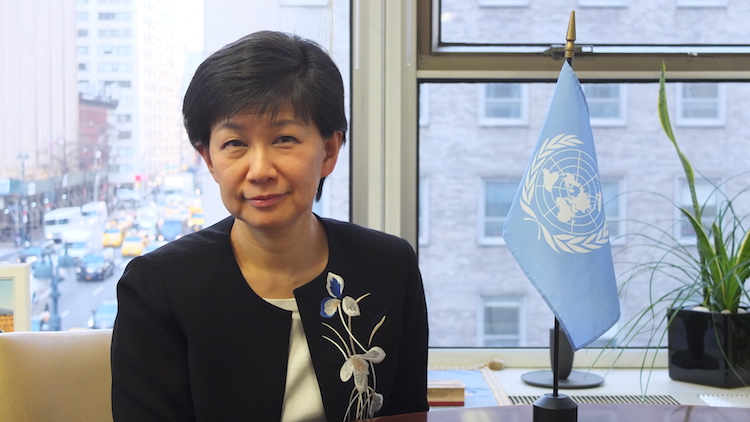Viewpoint by Izumi Nakamitsu
The following are extensive excerpts from a statement by Izumi Nakamitsu, the UN High Representative for Disarmament Affairs (UNODA) at a side event on October 18, 2018, organized by the Permanent Mission of Kazakhstan to the United Nations on Consolidating and Enhancing Cooperation among Nuclear-Weapon-Free Zones. – The Editor
NEW YORK (IDN-INPS) – Between the Treaty of Tlatelolco, which was signed in in 1967, to the Central Asian Nuclear Weapon-Free Zone, which entered into force in 2009, the world has experienced a growing adherence from States to nuclear weapon-free zones treaties.
Today, 115 states are parties and signatories to nuclear weapon-free zone treaties, representing almost 60 percent of the United Nations’ membership and almost making the entirety of the Southern Hemisphere a nuclear weapon-free zone.
The five Treaties – Tlatelolco, Central Asia, Rarotonga, Bangkok, Pelindaba – as well as Mongolia, which declared its territory a nuclear-weapon-free zone in 1999, represent an effective, practical and regional approach to strengthening global nuclear non-proliferation and disarmament norms.
As the Secretary-General said in his Disarmament Agenda, Securing Our Common Future, these zones are “landmark instruments” that represent an excellent example of the synergy between regional and global efforts towards a nuclear weapon free world.
Although nuclear-weapon-free zones should not be considered ends in themselves, each of these regional agreements adds significant value to our collective efforts to achieve a more peaceful and stable world.
The treaties establishing nuclear-weapon-free zones reinforce and complement other international legally binding disarmament instruments such as the Treaty on the Non-Proliferation of Nuclear Weapons (NPT), the Comprehensive Nuclear-Test-Ban Treaty (CTBT) and the Treaty on the Prohibition of Nuclear Weapons (TPNW).
For example, the Protocols to the treaties establishing NWFZs contain legally-binding negative security assurances that commit the nuclear-weapon States not to use or threaten to use nuclear weapons against the parties to such zones.
Although nuclear-weapon-free zones can be considered success stories in the collective pursuit of a world free of nuclear weapons, their full potential has yet to be achieved.
First, cooperation among zones is still weak. The five-yearly conferences of State Parties and Signatories of Treaties have been a useful tool to foster interaction between zones. However, there is no intersessional process to ensure comprehensive and sustainable coordination in order to fully implement the principles and objectives of the treaties or to exchange relevant ideas and best practices in areas of mutual interest.
Second, perhaps the most obvious challenge facing zones is that the Protocols to four of the five nuclear-weapon-free zones have yet to be ratified by all the nuclear-weapon States. Even States that have ratified such Protocols, have done so with declarations. Better coordination between zones could provide the opportunity to develop a cross-zone strategy to pursue signature and ratification of the relevant protocols.
Finally, there has been a clear absence of progress in pursuing new zones, especially a Middle East zone free of nuclear weapons and other weapons of mass destruction, as called for in the 1995 resolution on the Middle East adopted by the NPT Review and Extension Conference Resolution.
In his disarmament agenda, the Secretary-General reaffirms his willingness to work with Member States to strengthen and consolidate nuclear-weapon-free zones and the further establishment of such zones, including in the Middle East.
I hope today’s session can produce some concrete ideas of how we can work together to ensure nuclear-weapon-free zones can inspire our collective efforts to achieve a nuclear-weapon-free world. [IDN-InDepthNews – 23 October 2018]
Photo: Izumi Nakamitsu, the UN High Representative for Disarmament Affairs (UNODA). Credit: UNODA
IDN is flagship agency of the International Press Syndicate
facebook.com/IDN.GoingDeeper – twitter.com/InDepthNews

